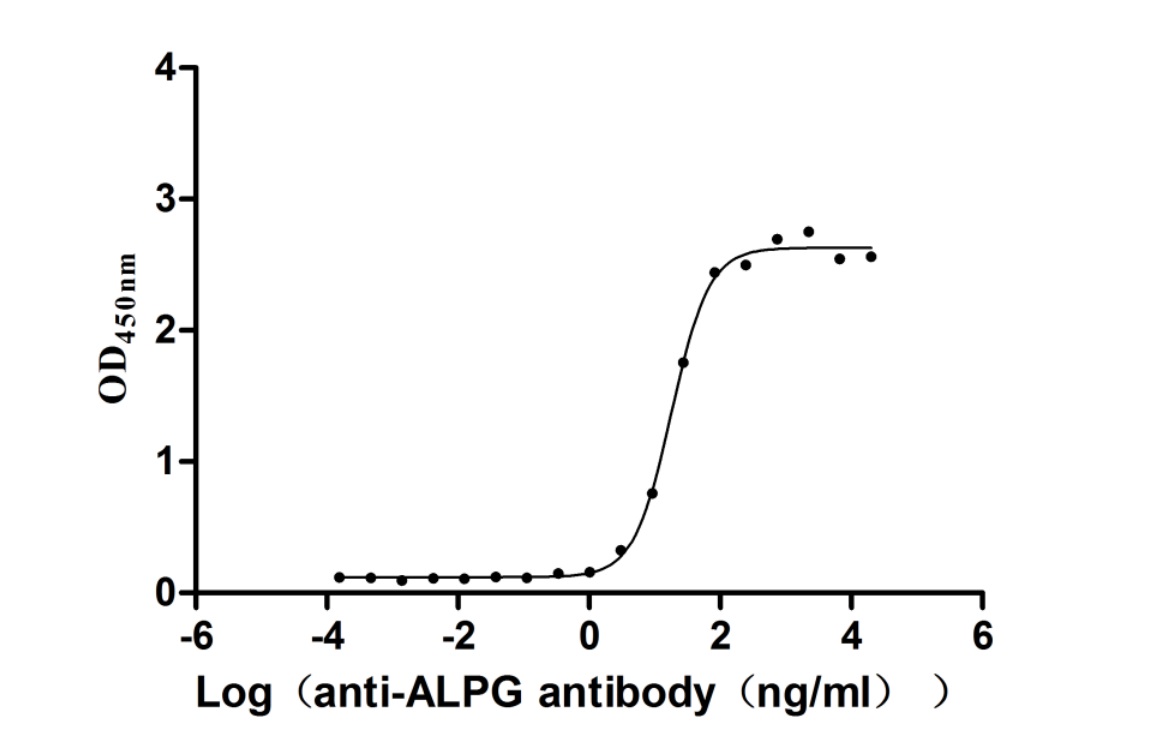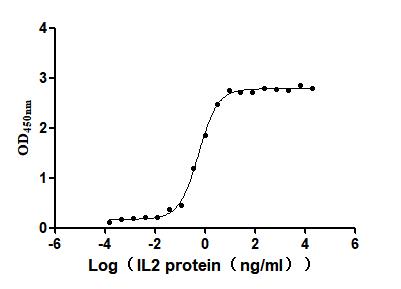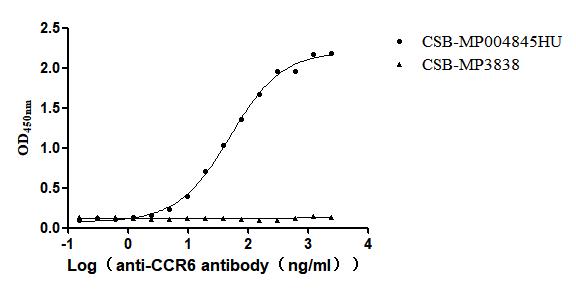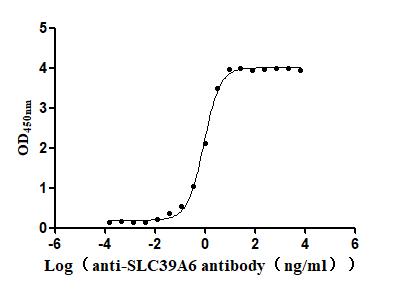Recombinant Human Adiponectin receptor protein 1 (ADIPOR1), partial
In Stock-
貨號(hào):CSB-CF001367HU2e1
-
規(guī)格:¥6864
-
圖片:
-
其他:
產(chǎn)品詳情
-
純度:Greater than 85% as determined by SDS-PAGE.
-
基因名:
-
Uniprot No.:
-
別名:ADIPOR1; PAQR1; TESBP1A; CGI-45; Adiponectin receptor protein 1; Progestin and adipoQ receptor family member 1; Progestin and adipoQ receptor family member I
-
種屬:Homo sapiens (Human)
-
蛋白長(zhǎng)度:Partial
-
來源:in vitro E.coli expression system
-
分子量:33.0 kDa
-
表達(dá)區(qū)域:89-375aa
-
氨基酸序列EGRWRVIPYDVLPDWLKDNDYLLHGHRPPMPSFRACFKSIFRIHTETGNIWTHLLGFVLFLFLGILTMLRPNMYFMAPLQEKVVFGMFFLGAVLCLSFSWLFHTVYCHSEKVSRTFSKLDYSGIALLIMGSFVPWLYYSFYCSPQPRLIYLSIVCVLGISAIIVAQWDRFATPKHRQTRAGVFLGLGLSGVVPTMHFTIAEGFVKATTVGQMGWFFLMAVMYITGAGLYAARIPERFFPGKFDIWFQSHQIFHVLVVAAAFVHFYGVSNLQEFRYGLEGGCTDDTLL
Note: The complete sequence may include tag sequence, target protein sequence, linker sequence and extra sequence that is translated with the protein sequence for the purpose(s) of secretion, stability, solubility, etc.
If the exact amino acid sequence of this recombinant protein is critical to your application, please explicitly request the full and complete sequence of this protein before ordering. -
蛋白標(biāo)簽:Tag-Free
-
產(chǎn)品提供形式:Liquid or Lyophilized powder
Note: We will preferentially ship the format that we have in stock, however, if you have any special requirement for the format, please remark your requirement when placing the order, we will prepare according to your demand. -
緩沖液:If the delivery form is liquid, the default storage buffer is Tris/PBS-based buffer, 5%-50% glycerol. If the delivery form is lyophilized powder, the buffer before lyophilization is Tris/PBS-based buffer, 6% Trehalose.
-
復(fù)溶:We recommend that this vial be briefly centrifuged prior to opening to bring the contents to the bottom. Please reconstitute protein in deionized sterile water to a concentration of 0.1-1.0 mg/mL.We recommend to add 5-50% of glycerol (final concentration) and aliquot for long-term storage at -20°C/-80°C. Our default final concentration of glycerol is 50%. Customers could use it as reference.
-
儲(chǔ)存條件:Store at -20°C/-80°C upon receipt, aliquoting is necessary for mutiple use. Avoid repeated freeze-thaw cycles.
-
保質(zhì)期:The shelf life is related to many factors, storage state, buffer ingredients, storage temperature and the stability of the protein itself.
Generally, the shelf life of liquid form is 6 months at -20°C/-80°C. The shelf life of lyophilized form is 12 months at -20°C/-80°C. -
貨期:3-7 business days
-
注意事項(xiàng):Repeated freezing and thawing is not recommended. Store working aliquots at 4°C for up to one week.
-
Datasheet & COA:Please contact us to get it.
相關(guān)產(chǎn)品
靶點(diǎn)詳情
-
功能:Receptor for ADIPOQ, an essential hormone secreted by adipocytes that regulates glucose and lipid metabolism. Required for normal glucose and fat homeostasis and for maintaining a normal body weight. ADIPOQ-binding activates a signaling cascade that leads to increased AMPK activity, and ultimately to increased fatty acid oxidation, increased glucose uptake and decreased gluconeogenesis. Has high affinity for globular adiponectin and low affinity for full-length adiponectin.
-
基因功能參考文獻(xiàn):
- Upregulation of ADIPOR1 and SPP1, among the adipokine gene family, in cancer tissue is associated with poor survival in CRC, suggesting a potential mechanism linking obesity and colorectal cancer. PMID: 29761507
- ADIPOR1 was consistently associated with diabetes and hypertriglyceridemia in an admixed Latin American population. PMID: 29145541
- miR-221 acts as a promoter of the EMT process in HCC cells by targeting AdipoR1 PMID: 28539268
- The pathways related to tumorigenicity and tumor progression, STAT2 and AdipoR1/AMPK/SIRT1 could be restrained by miR-3908. In conclusion, restoration of miR-3908 expression induced suppression of cancer progression and glioblastoma tumorigenicity. PMID: 28440504
- Review/Meta-analysis: genetic polymorphisms in leptin, adiponectin and their receptors affect the development and progression of prostate cancer. PMID: 27768592
- Renoprotection of adiponectin is associated with improvement of the endothelial dysfunction, reduction of oxidative stress, and upregulation of endothelial nitric oxide synthase expression through activation of adenosine 5'-monophosphate-activated protein kinase by AdipoR1 and activation of peroxisome proliferator-activated receptor (PPAR)-alpha signaling pathway by AdipoR2. [review] PMID: 28402446
- High ADIPOR1 expression is associated with breast cancer. PMID: 28327197
- revised ADIPOR1 crystal structure exhibiting a seven-transmembrane-domain architecture that is clearly distinct from that of ADIPOR2 PMID: 28329765
- TNF-alpha impairs adiponectin/AdipoR1 signaling, mitochondrial biogenesis, and myogenesis in primary human myotubes cultures obtained from heart failure patients. PMID: 26921438
- the knockdown phenotype was partially rescued by injecting wild-type, but not mutant, human ADIPOR1 mRNA. We conclude that ADIPOR1 is a novel adRP-causing gene and plays an important role in rod development and maintenance. PMID: 27655171
- Adiponectin stimulates cPLA2 and COX-2 expression via AdipoR1/2-dependent activation of PKC/NADPH oxidase/mitochondria resulting in ROS accumulation, p300 phosphorylation, and histone H4 acetylation. PMID: 27288489
- Decreased expression of ADIPOR1 is associated with polycystic ovary syndrome. PMID: 27075719
- sequence- and structure-based computational tools were employed in this study to functionally and structurally characterize the coding Nonsynonymous Single Nucleotide Polymorphisms of ADIPOR1 gene listed in the single nucleotide polymorphisms database. PMID: 27294143
- PCR results showed expression of adiponectin, AdipoR1, AdipoR2, follicle-stimulating hormone receptor (FSHR), and luteinizing hormone receptor (LHR) in granulosa cells (GCs). After controlling body mass index (BMI) values, qRT-PCR demonstrated a decreased expression of adiponectin system in GCs of polycystic ovary syndromepatients compared to those in controls PMID: 26631404
- ADPOR1 variants, rs3737884*G and rs7514221*C, may be shared risk factors associated with CAD, T2D, and T2D with CAD in a population of northeast China. PMID: 26741812
- Expression of AdipoR1 gene receptor was increased in endometriotic stromal cells. PMID: 26459399
- miR-323 may increase VEGF-A-mediated cancer vascularization in PC cells through AdipoR1 suppression. PMID: 26160610
- We did not find any significant associations with ADIPOR1 gene variants and fasting plasma triglycerides in HIV-infected patients. PMID: 26111083
- In conclusion, neutrophil AdipoRs (AdipoR1, AdipoR2) upregulation was associated with early stages of vascular injury, hypertension severity, and low serum levels of adiponectin PMID: 26146630
- The ADIPOR1 rs1342387(G/A) polymorphism, but not rs12733285(C/T) or rs7539542(C/G), may be associated with cancer risk, especially risk of colorectal cancer in Asians. PMID: 26047008
- Results demonstrate that the non-conserved N-terminal trunks dictate the cell-surface expression and temporal signaling profiles of AdipoR1 and AdipoR2. PMID: 25892445
- Decreased AdipoR1 mRNA levels and increased circulating adiponectin in advanced stages of coronary artery disease implies that CAD could be related to 'adiponectin resistance'. PMID: 25582653
- Data indicate the thermal stability of purified N-terminally truncated mutants of adiponectin receptors AdipoR1 and AdipoR2. PMID: 25575462
- The present data suggest that the disturbed interaction of adiponectin with AMPK is located downstream of the AdipoR1 receptor. PMID: 24104889
- we not only detected significant decreases in plasma adiponectin levels in prostate cancer patients, but also showed significant decreases in adiponectin receptor I (AdipoR1) levels in the resected prostate cancer specimen PMID: 25586350
- This study indicated that ApN may play a role in the progression of colorectal adenomatous polyps to carcinoma through actions on adipo-R1 and adipo-R2 receptors. PMID: 25640382
- crystal structures of the human adiponectin receptors AdipoR1 and AdipoR2 at 2.9 A and 2.4 A resolution, respectively PMID: 25855295
- down-regulation of adiponectin receptors (AdipoR1, R2, and T-cadherin) in osteoarthritic chondrocytes PMID: 24888493
- Data suggested that variant rs1342387 on ADIPOR1 may be a novel colorectal cancer susceptibility factor but not rs12733285 neither ADIPOQ variants rs266729, rs822395, rs2241766, and rs1501299. PMID: 25516230
- ADIPOR1 rs1342387 polymorphism is significantly associated with risk of colorectal cancer PMID: 25292021
- In conclusion, all these observations suggest that adiponectin influences bone metabolism decreasing the levels of bone formation. PMID: 24673523
- The improvement of insulin sensitivity by physical exercise is related to adiponectin and/or AdipoR1/R2 expression changes. PMID: 25126860
- uremia results in upregulation of AdipoR1 but adiponectin resistance at the post-receptor level. PMID: 25049200
- macrophage polarization is a key determinant regulating AdipoR expression and differential APN-mediated macrophage inflammatory responses PMID: 25392268
- In those with advanced stage gastric cancer, 7 of 39 had low Adipo-R1 expression (17.9%) and 16 had low Adipo-R2 expression (41%). PMID: 24969908
- Adiponectin Receptor 1 has a role in reversing imatinib resistance in K562 human chronic myeloid leukemia cells PMID: 25475722
- Low ADIPOR1 expression is associated with hepatocellular carcinoma. PMID: 24619866
- ADIPOR1 risk polymorphisms are a strong candidate for the "common soil" hypothesis and could partially contribute to disease susceptibility to T2D, CAD, and T2D with CAD in the Northern Han Chinese population PMID: 24967709
- AdipoR1 stimulates IL10 production by activating the AMPK and MAPKp38 pathways, whereas AdipoR2 modifies inflammatory processes by activating the COX-2 and PPARG pathways. PMID: 25261236
- SNP rs1539355 in the ADIPOR1 gene is associated with insulin resistance in Chinese PCOS patients. PMID: 24335000
- Genome-wide expression profiling identified the transcription of ADIPOR1, VAMP3 and C11ORF10 to be correlated with decreased ANRIL expression in a time-dependent manner. PMID: 23813974
- adiponectin receptors(AdipoR1 and -R2 ) are located, or re-located, in the plasma membrane with distribution in the cytoplasm when mononuclear cells are committed to differentiate to osteoclasts. PMID: 23971629
- established link between obesity and RCC can therefore be further explained by the adiponectin deficiency in obese individuals together with reduced AdipoR1 protein in RCC PMID: 24096711
- SNPs of both the adiponectin gene and its receptors AdipoR1 and AdipoR2 (including their haplotypes) appear as candidate genes and involved in the development of the state of insulin resistance. PMID: 23656997
- ADIPOR1 gene single nucleotide polymorphism (13423870) associated with the increased risk in cardiovascular diseases in patients with nonalcoholic fatty liver disease PMID: 23293232
- non-alcoholic fatty liver disease patients, who were carriers of G allele rs6666089 ADIPOR1 had higher levels of visceral, subcutaneous adipose tissue and their relation and percentage of liver fat in comparison with ADIPOR1 A allele carriers PMID: 23388528
- AdipoR1 and leptin receptor protein levels were significantly higher in Barrett's esophagus patients compared to controls and obese controls. PMID: 23756394
- these data suggest that AdipoR1 protein levels are regulated by so far uncharacterized class I PDZ proteins PMID: 23860432
- SNPs in ADIPOR1 were associated with weight gain in women diagnosed with breast cancer. PMID: 23922112
- Studies indicate that altered levels of adiponectin and leptin or their cognate receptors in cancers can ultimately lead to an imbalance in downstream molecular pathways. PMID: 23355630
顯示更多
收起更多
-
亞細(xì)胞定位:Cell membrane; Multi-pass membrane protein.
-
蛋白家族:ADIPOR family
-
組織特異性:Widely expressed. Highly expressed in heart and skeletal muscle. Expressed at intermediate level in brain, spleen, kidney, liver, placenta, lung and peripheral blood leukocytes. Weakly expressed in colon, thymus and small intestine.
-
數(shù)據(jù)庫(kù)鏈接:
Most popular with customers
-
Recombinant Human C5a anaphylatoxin chemotactic receptor 1 (C5AR1)-VLPs (Active)
Express system: Mammalian cell
Species: Homo sapiens (Human)
-
Recombinant Mouse Tyrosine-protein kinase Mer (Mertk), partial (Active)
Express system: Mammalian cell
Species: Mus musculus (Mouse)
-
Recombinant Human Dickkopf-related protein 1 (DKK1) (Active)
Express system: Mammalian cell
Species: Homo sapiens (Human)
-
Recombinant Human Alkaline phosphatase, germ cell type (ALPG) (Active)
Express system: Mammalian cell
Species: Homo sapiens (Human)
-
Recombinant Human Interleukin-2 (IL2) (Active)
Express system: Mammalian cell
Species: Homo sapiens (Human)
-
Recombinant Human C-C chemokine receptor type 6(CCR6)-VLPs (Active)
Express system: Mammalian cell
Species: Homo sapiens (Human)
-
Recombinant Macaca fascicularis Zinc transporter ZIP6 isoform X1(SLC39A6),partial (Active)
Express system: Baculovirus
Species: Macaca fascicularis (Crab-eating macaque) (Cynomolgus monkey)

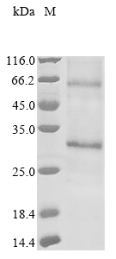

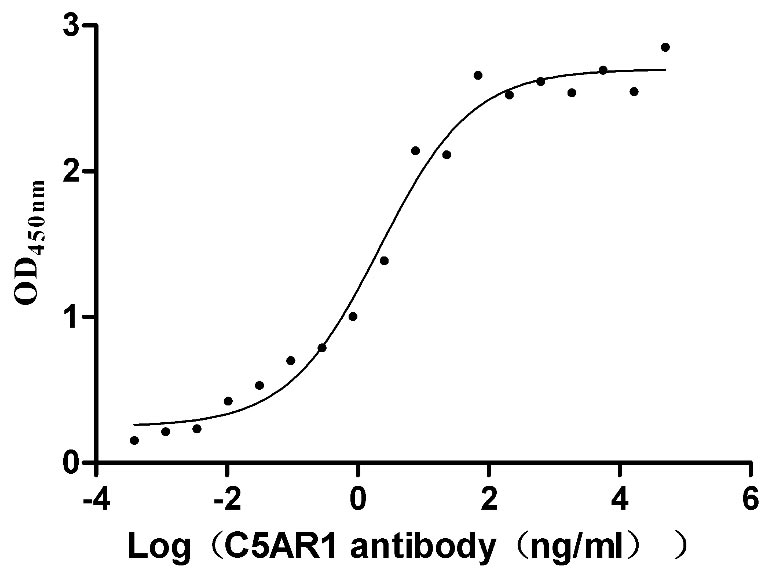
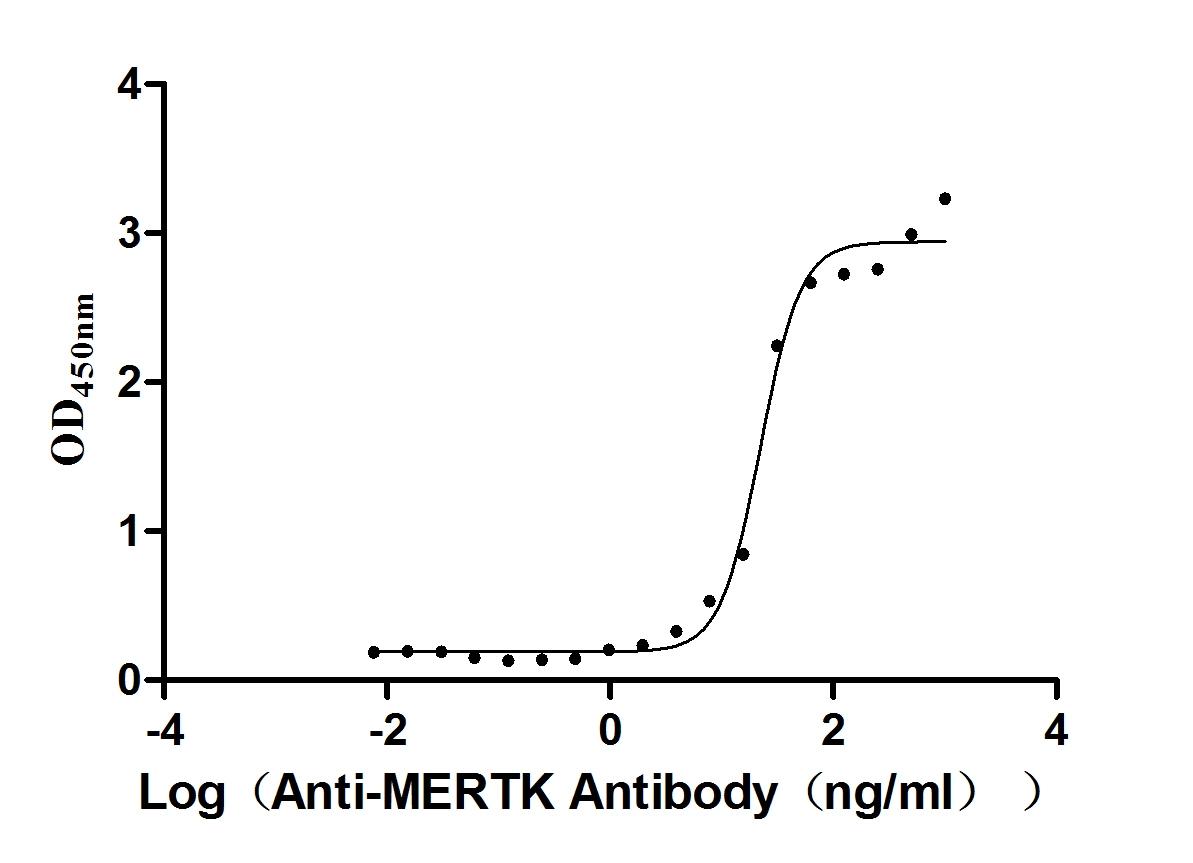
-AC1.jpg)
